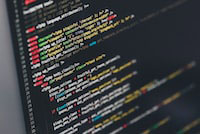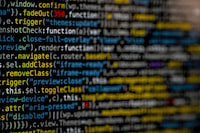The following introduces the difference between include() statement and require() statement in PHP code:
1. Different loading methods and error handling methods
include() statement can be placed in the flow control of the program. When the program is executed When it arrives, load the file in. When an error occurs (such as the file does not exist), only a warning will be generated. The require() statement is generally placed at the beginning of the program, and the file will be loaded when the program is executed. When an error occurs (such as the file does not exist), an error will be reported and the script will be terminated.
- 2.php performance
inlcude() statement will read and evaluate the file every time it is executed. require() statement performs file processing only once (actually the file content replaces the require() statement.
- 3.include_once() and require_once()
include_once() includes and Run the file. If the file is already included, it will not be included again.
require_once() first checks whether the file has been loaded during script execution. If it has been loaded, it will not be loaded again. For example, a file defines a type. An error will occur if the file is loaded twice
-
').addClass('pre-numbering').hide(); $(this).addClass('has-numbering').parent().append($numbering); for (i = 1; i
').text(i)); }; $numbering.fadeIn(1700); }); });
 vue3+vite:src使用require动态导入图片报错怎么解决May 21, 2023 pm 03:16 PM
vue3+vite:src使用require动态导入图片报错怎么解决May 21, 2023 pm 03:16 PMvue3+vite:src使用require动态导入图片报错和解决方法vue3+vite动态的导入多张图片vue3如果使用的是typescript开发,就会出现require引入图片报错,requireisnotdefined不能像使用vue2这样imgUrl:require(’…/assets/test.png’)导入,是因为typescript不支持require所以用import导入,下面介绍如何解决:使用awaitimport
 php include和include_once有什么区别Mar 22, 2023 am 10:38 AM
php include和include_once有什么区别Mar 22, 2023 am 10:38 AM当我们在使用 PHP 编写网页时,有时我们需要在当前 PHP 文件中包含其他 PHP 文件中的代码。这时,就可以使用 include 或 include_once 函数来实现文件包含。那么,include 和 include_once 到底有什么区别呢?
 require的用法有哪些Nov 27, 2023 am 10:03 AM
require的用法有哪些Nov 27, 2023 am 10:03 AMrequire用法:1、引入模块:在许多编程语言中,require用于引入外部模块或库,以便在程序中使用它们提供的功能。例如,在Ruby中,可以使用require来加载第三方库或模块;2、导入类或方法:在一些编程语言中,require用于导入特定的类或方法,以便在当前文件中使用它们;3、执行特定任务:在一些编程语言或框架中,require用于执行特定的任务或功能。
 PHP常用的文件操作函数总结Apr 03, 2024 pm 02:52 PM
PHP常用的文件操作函数总结Apr 03, 2024 pm 02:52 PM目录1:basename()2:copy()3:dirname()4:disk_free_space()5:disk_total_space()6:file_exists()7:file_get_contents()8:file_put_contents()9:filesize()10:filetype()11:glob()12:is_dir()13:is_writable()14:mkdir()15:move_uploaded_file()16:parse_ini_file()17:
 基于聚合数据的短信API接口调用示例-Python版Apr 03, 2024 pm 01:28 PM
基于聚合数据的短信API接口调用示例-Python版Apr 03, 2024 pm 01:28 PM一、申请接口通过https://www.juhe.cn/docs/api/id/54自助申请开通短信API,获得接口请求Key。(目前接口暂只支持企业类用户使用)申请后,在个人中心提交短信模板,聚合官方已经提供了多个常用模板,可以快捷申请使用。二、python代码示例官方接口文档请参考:Https://www.juhe.cn/docs/api/id/54#!/usr/bin/Python#-*-coding:utf-8-*-importurllib,urllib2,sys,JSONreload(
 jQuery如何添加类?Apr 03, 2024 am 09:01 AM
jQuery如何添加类?Apr 03, 2024 am 09:01 AM这篇文章将为大家详细讲解有关Jquery如何添加类?,小编觉得挺实用的,因此分享给大家做个参考,希望大家阅读完这篇文章后可以有所收获。jQuery添加类的两种常用方法1.addClass()方法addClass()方法为选定的元素添加一个或多个类。语法如下:$(selector).addClass(classNames);其中:selector:要添加类的元素选择器。classNames:要添加的类,可以是单个字符串或空格分隔的字符串列表。例如,以下代码为ID为my-element的元素添加ac
 解决php标题中的fatal error: require(): Failed opening required 'data/tdk.php' (include_path='.;C:\php\pear')的步骤Nov 27, 2023 pm 12:51 PM
解决php标题中的fatal error: require(): Failed opening required 'data/tdk.php' (include_path='.;C:\php\pear')的步骤Nov 27, 2023 pm 12:51 PM解决PHP标题中的fatalerror:require():Failedopeningrequired'data/tdk.php'(include_path='.;C:phppear')的步骤在使用PHP开发网站或应用程序时,我们经常会遇到各种错误。其中一个常见的错误是"fatalerror:require():Failed
 一文搞懂PHP中的DI依赖注入Apr 03, 2024 pm 01:46 PM
一文搞懂PHP中的DI依赖注入Apr 03, 2024 pm 01:46 PM目录什么是DI/依赖注入依赖注入出现的原因简单的依赖注入高阶的依赖注入依赖注入的应用依赖注入高阶优化什么是DI/依赖注入依赖注入DI其实本质上是指对类的依赖通过构造器完成自动注入通俗来说,就是你当前操作一个类,但是这个类的某些方法或者功能不是单单只靠这个类就能完成的,而是要借助另一个类的才能完成的最直接的标志就是传参数据为对象的时候。严格来说,你想在一个类中操作另一个类,这两个类之间形成了相互依赖关系,传参的方式叫注入依赖注入出现的原因在未使用依赖注入的时候,PHP需要在一个类中使用另一个类的时


Hot AI Tools

Undresser.AI Undress
AI-powered app for creating realistic nude photos

AI Clothes Remover
Online AI tool for removing clothes from photos.

Undress AI Tool
Undress images for free

Clothoff.io
AI clothes remover

AI Hentai Generator
Generate AI Hentai for free.

Hot Article

Hot Tools

VSCode Windows 64-bit Download
A free and powerful IDE editor launched by Microsoft

SublimeText3 Mac version
God-level code editing software (SublimeText3)

Zend Studio 13.0.1
Powerful PHP integrated development environment

mPDF
mPDF is a PHP library that can generate PDF files from UTF-8 encoded HTML. The original author, Ian Back, wrote mPDF to output PDF files "on the fly" from his website and handle different languages. It is slower than original scripts like HTML2FPDF and produces larger files when using Unicode fonts, but supports CSS styles etc. and has a lot of enhancements. Supports almost all languages, including RTL (Arabic and Hebrew) and CJK (Chinese, Japanese and Korean). Supports nested block-level elements (such as P, DIV),

SAP NetWeaver Server Adapter for Eclipse
Integrate Eclipse with SAP NetWeaver application server.






